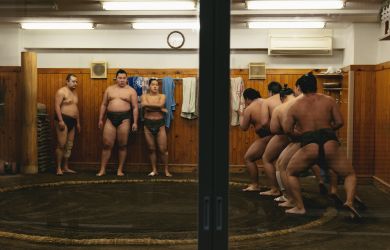
October 15, 2012
Ric O’Barry
The dolphin guru from The Cove is back—with a positive message
By Metropolis
Originally published on metropolis.co.jp on October 2012

your questions
Peter McEntyre—Did Flipper ever go on strike? When and if they refused to perform, what do you think they were trying to say to you?
O’Barry—Both yes. Unlike dogs, dolphins only perform for food. Dolphins only perform when kept in a state of food deprivation.
Henry Romesh Watts—What do you think of your environmentalist friend C. W. Nicol, who supports traditional hunting, and who only objects to killing of the inhumane kind?
O’Barry—[Laughs] I love Nic. But he’s talking about traditional whaling—which doesn’t happen anymore—not the factory kind. He’s opposed to [the dolphin killing in] Taiji.
Famous as the man behind Flipper who about-turned to become the world’s most notorious campaigner against dolphin abuse, Ric O’Barry is a man with a mission. When asked what he does in his spare time, he pauses. “I’m a monomaniac,” he sighs. “But my wife understands.”
Metropolis is talking to O’Barry in a Shinjuku café, with the 73-year-old here to work towards his next-year concert “Tokyo Celebrates the Dolphin.”
“Celebrates?” You’d be forgiven some confusion. O’Barry was the protagonist of Louie Psihoyos’ Oscar-winning 2009 documentary The Cove, about the annual “dolphin drive” in Taiji which kills a purported 23,000 aquatic mammals.
But the campaign has caused worldwide antipathy towards Japanese people. “The dolphin drive in Taiji is just done by 47 people,” says O’Barry. “We asked about 100 Japanese if they knew about it, and they said no. They were shocked.” Add to that the veneration of dolphins in other parts—such as Izu’s Miyakejima island for example, where they are even given honorary citizen status—and there’s plenty to draw on in a dolphin celebration.
In 1975-76, O’Barry traveled around the US—and eventually Japan—with a collection of musicians called The Rolling Coconut Review. Their mission—to stop the “Save the Whales” boycott of Japan. “Asian kids were getting beaten up in American schools,” he explains. The Japan concert brought together both Japanese and US artists on stage together—and the boycott was lifted soon after.
So why does O’Barry love dolphins so much? “I’ve always been around them,” he says. On Christmas Day, 1955, O’Barry visited the Miami Seaquarium with his family while on leave from the Navy. In a massive tank he saw a 500-pound grouper, a 40-foot swordfish… and some dolphins. “There was a guy underwater in a diving suit, passing out fish from a bucket,” O’Barry recounts. “I said, ‘when I get out the Navy, I’m going to do that.’” Five years later, he got the job.
Eventually he hit fame with the TV show Flipper, where he trained five dolphins to play the lead role and inspired a global craze in dolphin parks. But as the years went on, he started feeling it wasn’t right. When a dolphin voluntarily closed its blowhole in his arms—effectively committing suicide—that’s when O’Barry got out. And he’s spent the last 30 odd years trying to destroy the industry he was instrumental in creating.
Tokyo Celebrates the Dolphin 2013 will feature Arielle and the Dolphin Project Band, consisting of top artists from around the world. “We can’t mention any names right now,” says O’Barry. “But it’s going to be big.”
For more info, watch this space: http://dolphinproject.org





